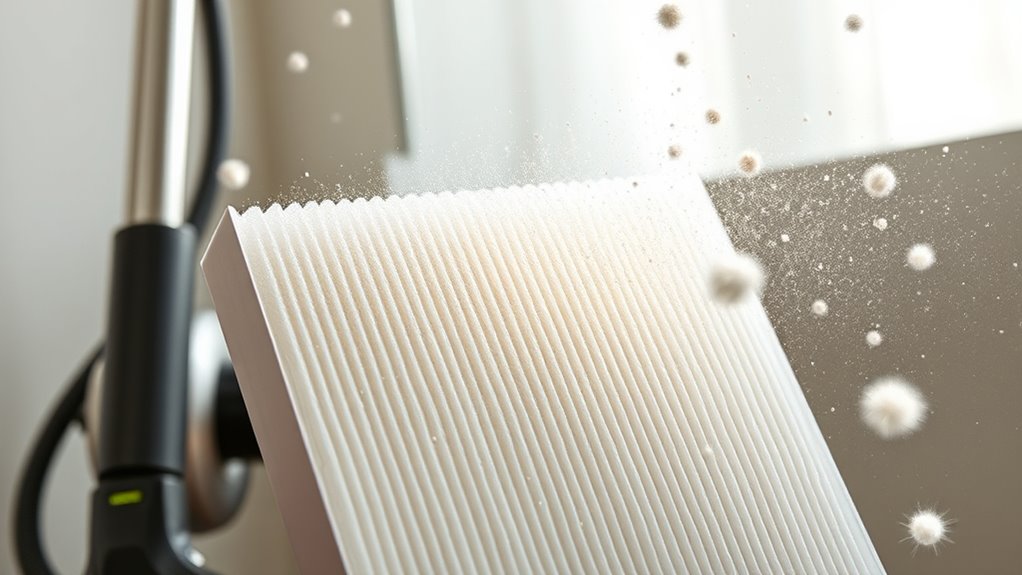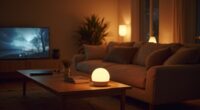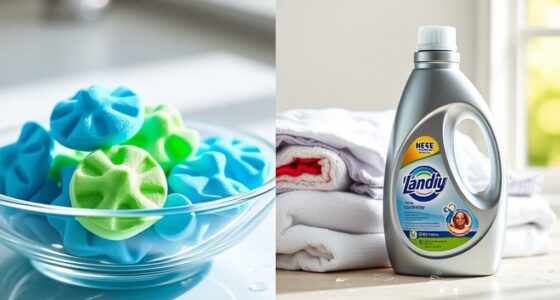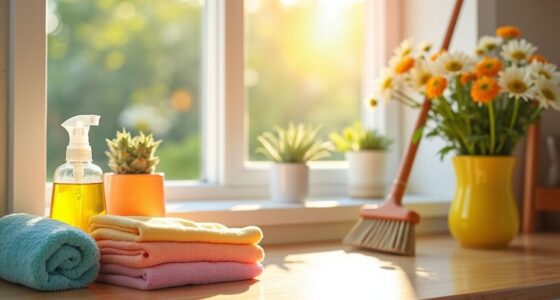A HEPA filter, or High Efficiency Particulate Air filter, captures at least 99.97% of airborne particles, making it essential for both vacuums and air purifiers. It helps remove dust, pollen, pet dander, and even some bacteria and viruses from your home, improving air quality and reducing allergens. By ensuring these devices utilize true HEPA filters, you can maintain a healthier living space. Want to know more about how these filters work and their grades? Keep going!
Key Takeaways
- HEPA stands for High Efficiency Particulate Air filter, capturing at least 99.97% of airborne particles down to 0.3 microns in size.
- HEPA filters improve air quality by preventing harmful particles like dust, pollen, and allergens from recirculating back into your home.
- They provide medical-grade protection against airborne pathogens, benefiting those with allergies or respiratory issues.
- Regular maintenance and replacing filters as recommended ensure optimal performance and efficiency in vacuums and purifiers.
- Combining HEPA filters with additional methods, like activated carbon or UV light, enhances overall air purification effectiveness.
What Is a HEPA Filter?
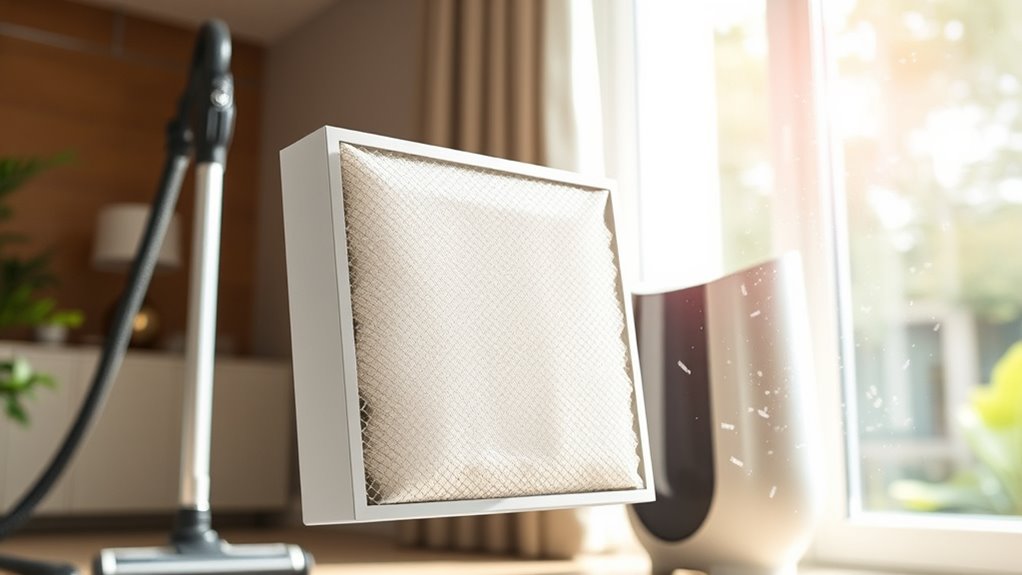
A HEPA filter, short for High Efficiency Particulate Air filter, is a powerful tool designed to enhance your indoor air quality. It captures at least 99.97% of airborne particles that are 0.3 microns in diameter, making it incredibly effective. HEPA filters are commonly used in various air purifiers and vacuums to ensure that dust, pollen, pet dander, smoke, and even some bacteria and viruses are trapped and not recirculated into your living space. These filters operate by forcing air through a mat of randomly arranged fibers, utilizing mechanisms like diffusion, interception, and impaction to eliminate contaminants. Meeting strict standards set by organizations like the Institute of Environmental Sciences and Technology and the United States Department of Energy, HEPA filters are essential for cleaner, healthier air. Additionally, vacuums equipped with anti-allergen technology can further improve indoor air quality by effectively capturing allergens. Furthermore, utilizing a high CADR air purifier can significantly enhance your home’s air purification efficiency. In fact, choosing vacuums with HEPA filtration can greatly benefit households with pets and allergy sufferers. Regular filter replacement is necessary to maintain optimal performance and ensure continuous allergen removal.
How Does a HEPA Filter Work?
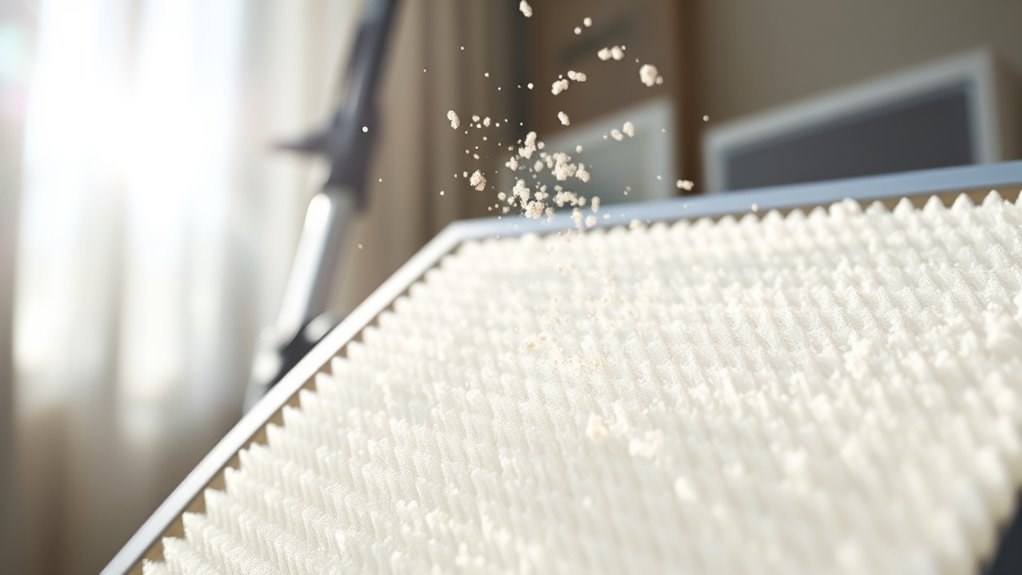
Understanding how a HEPA filter works can help you appreciate its role in improving indoor air quality.
A HEPA filter is designed to capture at least 99.97% of air particles that are 0.3 microns in diameter. It achieves this through three mechanisms: diffusion, interception, and impaction. Proper airflow around the filter is essential for maximizing its efficiency. The importance of risk management strategies is reflected in how effectively a HEPA filter can maintain clean air by minimizing the impact of airborne contaminants. In fact, many best air purifiers utilize HEPA filters as a standard feature to ensure high performance.
Smaller particles are trapped through random collisions, while larger ones are captured as they flow through the fibers or by direct contact. The filter’s dense mat of randomly arranged fiberglass fibers increases surface area, enhancing efficiency. Additionally, HEPA filters are commonly found in air purifiers due to their effectiveness in removing allergens.
Smaller particles are captured through random collisions, while larger ones are ensnared by fibers and direct contact.
Curiously, HEPA filters can even capture smaller particles like viruses more effectively due to their erratic movement. Proper sealing also guarantees that unfiltered air doesn’t bypass the filter, assuring thorough air purification. Additionally, sound waves can influence brainwave patterns, which may contribute to an overall healthier indoor environment by reducing stress.
Benefits of Using HEPA Filters in Vacuums and Purifiers
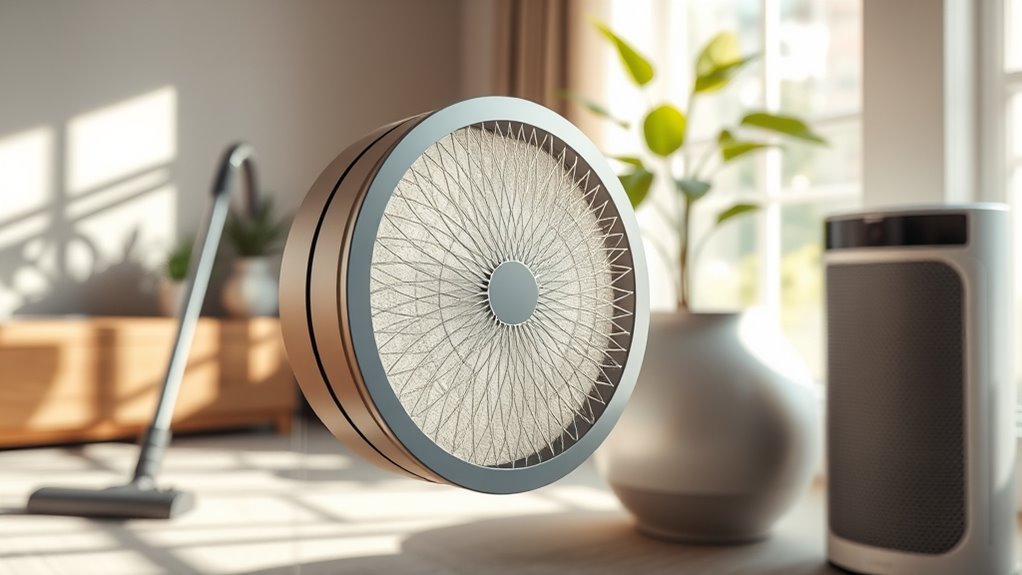
Using HEPA filters in vacuums and air purifiers offers numerous benefits that can greatly enhance your indoor air quality.
These filters are designed to capture at least 99.97% of harmful particles, making them essential for healthier living spaces.
Here are some key advantages:
- Effectively traps allergens like dust, pollen, and pet dander
- Prevents the recirculation of harmful particles back into the air
- Reduces respiratory issues, especially for allergy sufferers
- Provides medical-grade protection against airborne pathogens
- Guarantees ideal performance with regular maintenance and filter replacement
- Additionally, HEPA filters contribute to improved air quality, which can lead to better sleep patterns and enhanced mood. They are especially beneficial when paired with the best vacuums for hardwood floors, ensuring comprehensive cleaning. Regular use of HEPA-equipped devices can significantly reduce indoor air pollutants, promoting a healthier living environment. Moreover, just like a high-quality projector, a good HEPA filter can greatly improve image quality by ensuring that the air in your home is free from dust and other harmful particles that can settle on surfaces.
Understanding HEPA Filter Grades

HEPA filter grades play a significant role in determining how effectively a filter captures airborne particles.
These grades indicate how well the filter performs in HEPA filtration, with higher grades signifying greater efficiency in trapping pollutants. The most common classification, H13, captures at least 99.95% of the most penetrating particles (MPPS), making it ideal for removing harmful contaminants. Proper maintenance of toilet functionality can also help maintain overall indoor air quality by reducing unwanted odors. Additionally, maintaining effective co-parenting communication can contribute to a healthier home environment, which may enhance the overall air quality experience for children. Understanding the importance of emotional well-being in children can also help parents create a more supportive atmosphere at home. To promote a cozy and inviting atmosphere, consider incorporating cozy textiles in your living space.
If you need even stricter air quality, H14 filters achieve a remarkable 99.995% capture rate.
However, remember that higher-grade air filters can increase airflow resistance, potentially impacting performance in vacuums and purifiers.
To guarantee superior air quality, it’s essential that your device meets HEPA standards, particularly with fully-sealed filtration systems to prevent dirty air from bypassing the filter. Additionally, the rise in popularity of eco-friendly options in air purification aligns with consumers’ growing preference for sustainable products.
Are All HEPA Filters the Same?
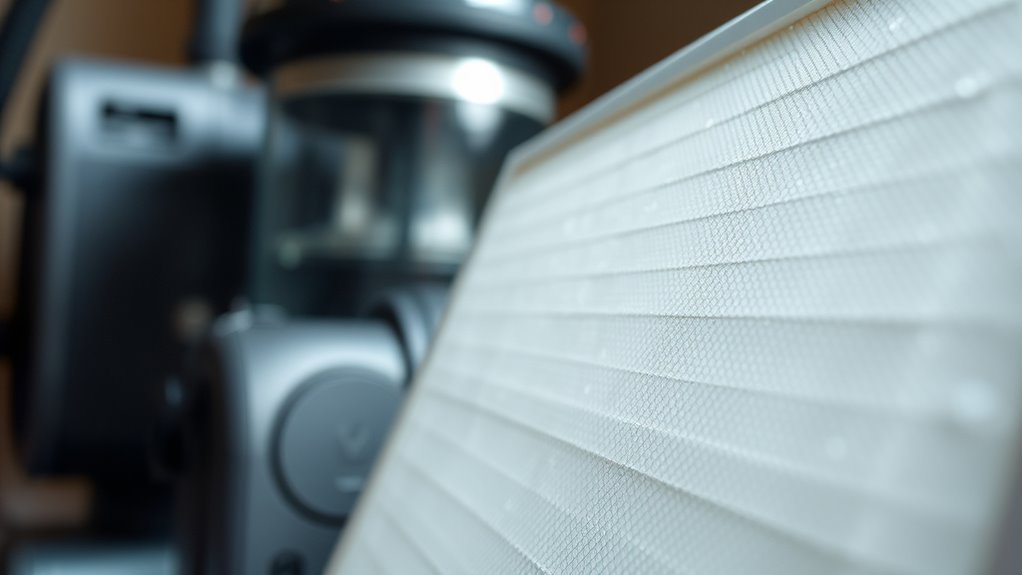
Are all HEPA filters the same?
How can you be sure that all HEPA filters aren’t created equal? The truth is, they can vary considerably in efficiency ratings and filtration performance. Here are key factors to take into account:
- True HEPA Filters: Capture at least 99.97% of particles down to 0.3 microns.
- Grade Matters: H13 grade filters have better capture efficiency than lower grades.
- Seal Integrity: Fully-sealed filters prevent air bypass, ensuring true HEPA performance.
- Material Differences: Varying materials and construction methods affect durability and filtration capabilities. For instance, high-quality materials can enhance the overall effectiveness of the filter. Additionally, the use of specialized filters in air purifiers further improves air quality. Moreover, using filters with a longer shelf life can reduce the frequency of replacements.
- Pre-Filters: Some systems include pre-filters to capture larger particles, extending the HEPA filter’s lifespan.
Choosing high-quality HEPA filters is essential for ideal air quality and health benefits. Additionally, just as with wood stove decor enhancing the ambiance, effective air purification can contribute to a cozy home environment.
Importance of Fully-Sealed Filtration Systems

A fully-sealed filtration system is essential for preventing air bypass, ensuring every bit of air passes through the HEPA filter.
This design maximizes efficiency and keeps harmful particles from escaping back into your space.
If you want peak air quality, investing in a vacuum or purifier with a fully-sealed system is a smart choice.
Prevents Air Bypass
Air quality is directly impacted by the effectiveness of filtration systems, and fully-sealed designs play an important role in this process.
When you use a vacuum or air purifier, it’s vital that all air passes through the HEPA filter to guarantee peak air quality. Here’s why preventing air bypass matters:
- Fully-sealed systems block unfiltered air from escaping.
- Small leaks can let dirty air diminish HEPA efficiency.
- Proper sealing around filters maintains filtration integrity.
- Dyson’s Purifier Formaldehyde range meets HEPA H13 standards, preventing leaks.
- A sealed system enhances air quality and extends HEPA filter lifespan.
Ensures Maximum Efficiency
Maintaining peak air quality hinges on the efficiency of your filtration system, which is why fully-sealed designs are so important. A fully-sealed system guarantees that unfiltered air doesn’t bypass the HEPA filter, effectively capturing 99.97% of particles down to 0.3 microns.
Even the tiniest leaks can compromise the HEPA filter’s performance, allowing harmful particles back into your indoor air. Dyson’s Purifier Formaldehyde range exemplifies this, featuring sealed machines that meet HEPA H13 standards for medical-grade filtration.
Additional Filtration Methods for Enhanced Air Quality
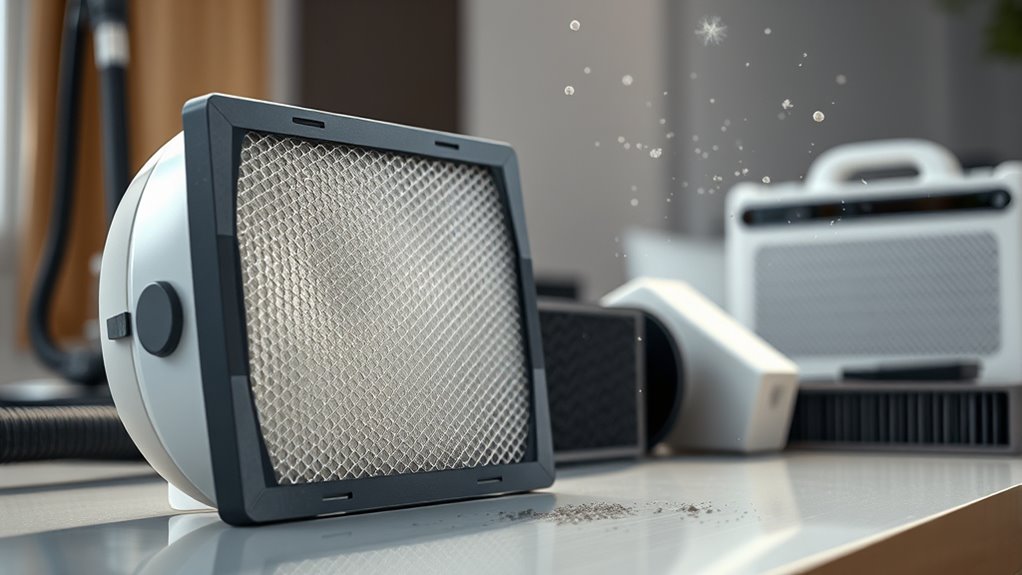
To improve your indoor air quality even further, consider additional filtration methods like activated carbon filters and ultraviolet light technology.
These options work alongside HEPA filters to capture odors and eliminate harmful microorganisms.
Incorporating ionic air purifiers can also enhance your air purification strategy, giving you cleaner, fresher air.
Activated Carbon Filters
While HEPA filters excel at capturing particulate matter, adding activated carbon filters to your vacuum or air purifier can greatly enhance your indoor air quality.
Activated carbon filters are designed to absorb gaseous pollutants and odors, such as volatile organic compounds (VOCs) and smoke.
Here’s how they contribute:
- Capture harmful gases and odors
- Reduce chemical sensitivities
- Improve overall air quality
- Work effectively in both residential and commercial settings
- Require regular replacement every 3-6 months
Ultraviolet Light Technology
Integrating ultraviolet (UV) light technology into your air purifier can greatly enhance your indoor air quality. This advanced method, especially UVC light, effectively kills or inactivates harmful microorganisms, improving the overall environment.
UVC light targets the DNA or RNA of pathogens, preventing them from reproducing and reducing the microbial load in your home. When combined with high-efficiency particulate air (HEPA) filters, UV light technology captures airborne particles while neutralizing viruses, bacteria, and mold simultaneously.
This dual-action approach provides a thorough solution for cleaner air. Whether in residential or commercial settings, regular maintenance and proper integration of UVC technology guarantee peak effectiveness in sterilizing the air you breathe, making it a valuable addition to your air purification system.
Ionic Air Purifiers
Ionic air purifiers offer an innovative way to enhance your indoor air quality by utilizing charged ions to tackle airborne pollutants.
These devices emit negatively charged ions that attach to positively charged particles, causing them to clump together and settle out of the air. While they effectively reduce dust, smoke, and allergens, they’re best used alongside other air filters for ideal results.
Here are some benefits of ionic purifiers:
- No regular filter replacements needed
- Quiet operation, perfect for bedrooms
- Reduces airborne particles like dust and allergens
- Easy to clean for optimal performance
- Works well with HEPA filters for extensive air purification
Incorporating ionic purifiers into your home can greatly improve your air quality.
Tips for Maintaining HEPA Filters in Your Devices
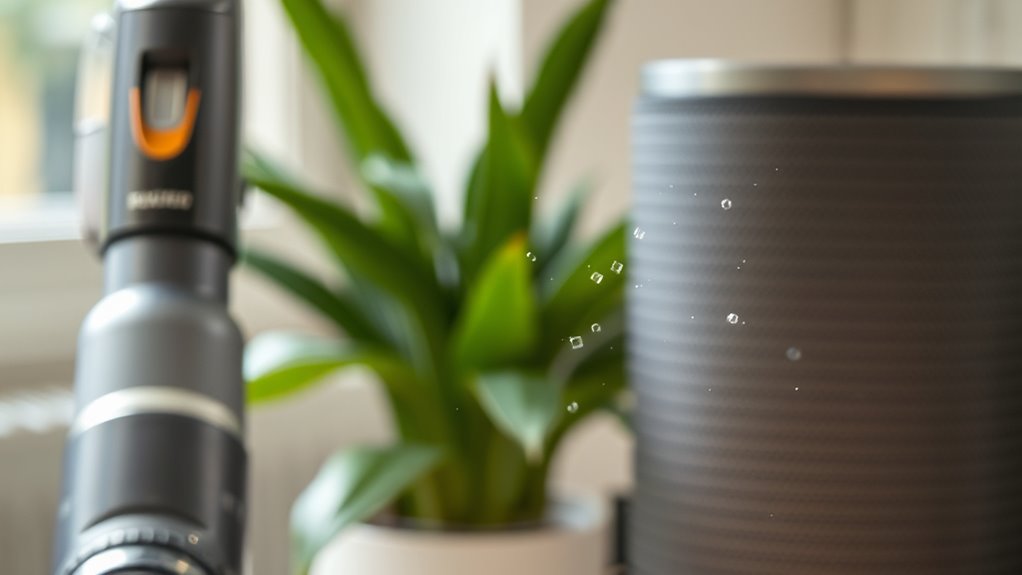
To guarantee your HEPA filters perform at their peak, you should regularly check them every two weeks for signs of wear or discoloration.
The average lifespan of HEPA filters is around 5-6 years, but this can vary based on how often you use your device and the air quality in your environment.
Replace filters according to the manufacturer’s recommendations, typically every 6 months to a year, to maintain air quality and prevent reduced suction.
Consider using pre-filters to capture larger particles before they reach your HEPA filter, extending its life.
Always opt for genuine filters from the manufacturer, as third-party options may compromise your device’s effectiveness.
Keeping these tips in mind will guarantee superior performance for your vacuums and purifiers.
Frequently Asked Questions
Is a HEPA Filter Necessary on a Vacuum?
You’ll find that a HEPA filter is essential for your vacuum if you want to keep indoor air quality high.
Without it, your vacuum might just recirculate dust and allergens, which can trigger allergies or respiratory issues.
By using a vacuum with a HEPA filter, you capture those tiny particles effectively.
If you’re serious about maintaining a clean and healthy environment, investing in a vacuum with a HEPA filter is definitely worth it.
What Is the Purpose of a HEPA Filter?
Imagine your home is a fish tank, and air quality is the water. A HEPA filter acts like a powerful filtration system, ensuring only the cleanest water circulates, trapping harmful particles like dust and allergens.
Its purpose is to purify your indoor air, promoting better health and comfort. By capturing 99.97% of airborne pollutants, it helps you breathe easier, especially if you have allergies or respiratory issues.
Regular maintenance keeps it performing at its best!
What Happens if You Don’t Replace HEPA Filter?
If you don’t replace your HEPA filter, its ability to capture airborne particles diminishes, allowing pollutants to circulate back into your home.
You’ll notice reduced airflow, making your vacuum or purifier work harder, which can shorten its lifespan.
Over time, a dirty filter can even emit unpleasant odors.
Most importantly, neglected filters can worsen indoor air quality, increasing allergens and potentially aggravating respiratory problems.
Regular replacements are essential for maintaining a healthy living environment.
Do You Need a HEPA Filter for an Air Purifier?
“Better safe than sorry.” You definitely need a HEPA filter for your air purifier.
It traps 99.97% of airborne particles, ensuring you breathe cleaner air. If you suffer from allergies or asthma, a HEPA filter can drastically improve your indoor air quality by reducing allergens like dust and pet dander.
Regularly replacing the filter keeps your purifier efficient, allowing you to maintain a healthy home environment for yourself and your family.
Conclusion
In the world of clean air, a HEPA filter is your trusty shield, capturing unseen foes like dust and allergens. By choosing vacuums and purifiers equipped with these filters, you’re not just cleaning; you’re creating a sanctuary within your home. Just as a lighthouse guides ships safely to shore, a HEPA filter illuminates your path to healthier living. Maintain it well, and you’ll keep the air crisp and refreshing, ensuring your haven remains a revitalizing atmosphere.
